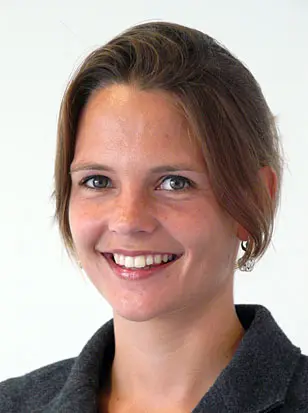Bei vielen häufigen Krebserkrankungen gelangen Tumorzellen über die Lymphbahnen in die Leber und wachsen dort zu Metastasen heran. Diese Tochtergeschwulste werden heute oft durch Hitzeeinwirkung behandelt. Bei der Planung dieser minimal-invasiven Eingriffe, der so genannten Thermoablation, legen die Ärzte fest, wo und wie sie ihre feinen, nadelförmigen Instrumente einführen müssen, um den Tumor zu treffen. Während des Eingriffs stehen ihnen zur räumlichen Orientierung nur zweidimensionale Bilder aus der Computertomographie zur Verfügung. Das Organ wird durch Atmung und Herzschlag ständig bewegt, darüber hinaus bewirken die Instrumente, die der Operateur ansetzt, eine Verformung des weichen Lebergewebes. Beide Faktoren erschweren es den Ärzten zusätzlich, ihre Zielstrukturen auf Anhieb präzise zu treffen, ohne dabei z. B. wichtige Blutgefäße zu verletzen.
In ihrer Doktorarbeit in der Abteilung Medizinische und biologische Informatik im Deutschen Krebsforschungszentrum hat sich Dr. Lena Maier-Hein dieses Problems angenommen. Das Ergebnis ihrer Forschung ist ein computergesteuertes Positionierungssystem, das in Echtzeit berechnet, wo genau sich der Tumor befindet, und den Ärzten auf einem Monitor die idealen Einstichstellen und -winkel anzeigt, um den Tumor gleich beim ersten Versuch zu treffen und dabei wichtige Strukturen der Leber weitestgehend zu schonen.
Der Trick von Lena Maier-Heins Erfindung sind Hilfsnadeln, die bereits vor der CT-Untersuchung der Leber in der Nähe der Metastase eingeführt werden und daher auf den Röntgenbildern sichtbar sind. Während des Eingriffs verfolgt eine Stereokamera die Bewegung der äußeren Enden dieser Hilfsnadeln, aus deren Position daraufhin die Tumorlokalisation errechnet wird.
Um das neue Zielsystem zu überprüfen, entwickelten Lena Maier-Hein und ihre Kollegen ein Torsomodell, mit dem die Atembewegung an Organen von Schlachttieren simuliert werden kann. Da diese ohnehin anfallen, kamen die Wissenschafter mit einen Minimum an Tierversuchen aus. Lena Maier-Heins Entwicklung, die bald im Operationssaal erprobt werden soll, verspricht in Zukunft eine schonendere Behandlung von Lebermetastasen.
Lena Maier-Hein, Jahrgang 1980, schloss 2005 ihr Informatikstudium an der Universität Karlsruhe mit Auszeichnung ab. Ihre wissenschaftlichen Leistungen im Studium sowie in der Diplom- und Doktorarbeit wurden bereits mit zahlreichen Preisen ausgezeichnet. Für die Erfindungen aus ihrer Doktorarbeit wurden mehrere Patente erteilt.
Das Deutsche Krebsforschungszentrum vergibt die in diesem Jahr mit 7.500 Euro dotierte Auszeichnung zum dritten Mal. Die Wiesbadener Gymnasiallehrerin Waltraud Lewenz unterstützte mit ihrem Nachlass die beiden Forschungsschwerpunkte „Krebsrisikofaktoren und -prävention“ sowie „Diagnostik und experimentelle Therapie“ des Deutschen Krebsforschungszentrums. Darüber hinaus stiftete sie den alle zwei Jahre zu vergebenden Preis für exzellente wissenschaftliche Leistungen in den beiden genannten Forschungsbereichen.
Der Preis wird am Dienstag, dem 21. Juli, im Deutschen Krebsforschungszentrum verliehen.
Ein Foto der Preisträgerin steht zur Verfügung unter:
www.dkfz.de/de/presse/pressemitteilungen/2009/images/Maier-Hein.jpg
Eine 3D-Darstellung einer Leberpunktion kann heruntergeladen werden unter:
www.dkfz.de/de/presse/pressemitteilungen/2009/images/Leberpunktion_WLP.jpg
(Lebermetastase = rot, Blutgefäße = dunkelgrau und violett, Gallenblase = grün)
Über das DKFZ
Das Deutsche Krebsforschungszentrum (DKFZ) ist mit mehr als 3.000 Mitarbeiterinnen und Mitarbeitern die größte biomedizinische Forschungseinrichtung in Deutschland. Wissenschaftlerinnen und Wissenschaftler erforschen im DKFZ, wie Krebs entsteht, erfassen Krebsrisikofaktoren und suchen nach neuen Strategien, die verhindern, dass Menschen an Krebs erkranken. Sie entwickeln neue Methoden, mit denen Tumoren präziser diagnostiziert und Krebspatienten erfolgreicher behandelt werden können. Beim Krebsinformationsdienst (KID) des DKFZ erhalten Betroffene, Interessierte und Fachkreise individuelle Antworten auf alle Fragen zum Thema Krebs.
Um vielversprechende Ansätze aus der Krebsforschung in die Klinik zu übertragen und so die Chancen von Patientinnen und Patienten zu verbessern, betreibt das DKFZ gemeinsam mit exzellenten Universitätskliniken und Forschungseinrichtungen in ganz Deutschland Translationszentren:
- Nationales Centrum für Tumorerkrankungen (NCT, 6 Standorte)
- Deutsches Konsortium für Translationale Krebsforschung (DKTK, 8 Standorte)
- Hopp-Kindertumorzentrum (KiTZ) Heidelberg
- Helmholtz-Institut für translationale Onkologie (HI-TRON) Mainz – ein Helmholtz-Institut des DKFZ
- DKFZ-Hector Krebsinstitut an der Universitätsmedizin Mannheim
- Nationales Krebspräventionszentrum (gemeinsam mit der Deutschen Krebshilfe)
Das DKFZ wird zu 90 Prozent vom Bundesministerium für Bildung und Forschung und zu 10 Prozent vom Land Baden-Württemberg finanziert und ist Mitglied in der Helmholtz-Gemeinschaft Deutscher Forschungszentren.
